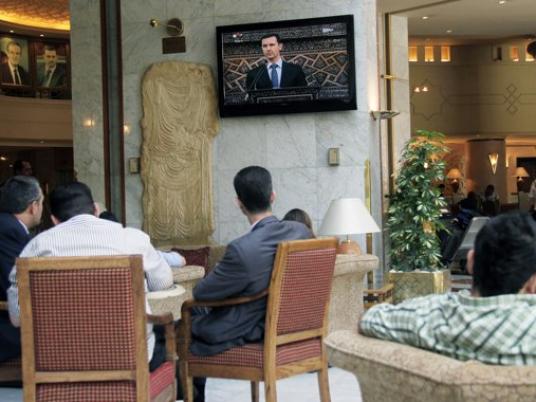
BEIRUT — Syrian President Bashar al-Assad denied Sunday that his government had anything to do with last week's gruesome Houla massacre, saying not even "monsters" would carry out such an ugly crime.
In a televised speech to parliament, Assad said his country is facing a "real war" and he blamed terrorists and extremists for the bloodshed. He expressed horror over last week's massacre in the central Houla region, which killed more than 100 people, nearly half of them children.
"If we don't feel the pain the pain that squeezes our hearts, as I felt it, for the cruel scenes — especially the children — then we are not human beings," Assad said in his first comments on the massacre. His last public address was in January.
Assad, 46, denies that there is a popular will behind the uprising, saying foreign extremists and terrorists are driving the revolt.
His remarks suggest he is still standing his ground, despite widespread international condemnation over his deadly crackdown on dissent. Although his words reflected many of the same general points of his previous speeches — blaming terrorists and extremists, vowing to protect national security — his comments on Houla were widely anticipated.
"We have to fight terrorism for the country to heal," Assad said Sunday. "We will not be lenient. We will be forgiving only for those who renounce terrorism."
The opposition and the government have exchanged accusations over the Houla killings, each blaming the other. UN investigators have said there are strong suspicions that pro-regime gunmen are responsible for at least some of the killings.
The revolt began last March with mostly peaceful protests, but a ferocious government crackdown led many in the opposition to take up arms. Now, the conflict has morphed into an armed insurgency.
"A battle was forced on us, and the result was this bloodshed that we are seeing," Assad said.
Assad, who inherited power from his father in 2000, still has a firm grip on power in Syria some 15 months into a revolt that has torn at the country's fabric and threatened to undermine stability in the Middle East.
Activists say as many as 13,000 people have died in the violence. One year after the revolt began, the UN put the toll at 9,000, but hundreds more have died since. A cease-fire plan brokered by international envoy Kofi Annan is violated by both sides every day. Fears also have risen that the violence could spread and provoke a regional conflagration.
A group known as the Free Syrian Army is determined to bring down the regime by force of arms, targeting military checkpoints and other government sites. A UN observer team with nearly 300 members has done little to quell the bloodshed.
Al-Qaeda-style suicide bombings have become increasingly common in Syria, and Western officials say there is little doubt that Islamist extremists, some associated with the terror network, have made inroads in Syria as instability has spread.
Assad has acknowledged there are genuine calls for reform, although the opposition says he has offered only cosmetic changes that do little to change a culture where any whisper of dissent could lead to arrest and torture.
In Sunday's speech, Assad ridiculed protesters over their calls for freedom.
"This freedom that they called for has turned into the [human] remains of our sons and this democracy that they talked about is now drowning in our blood," he said.




